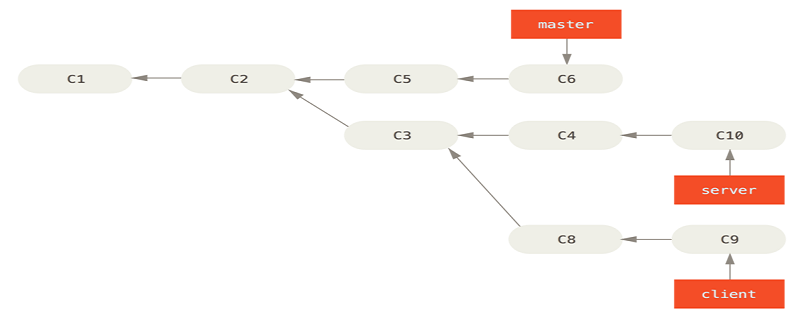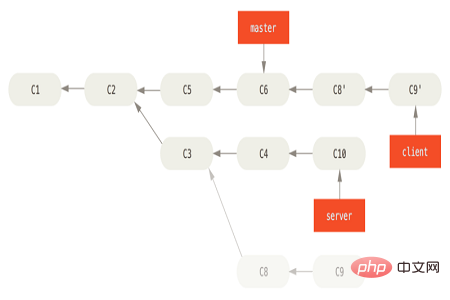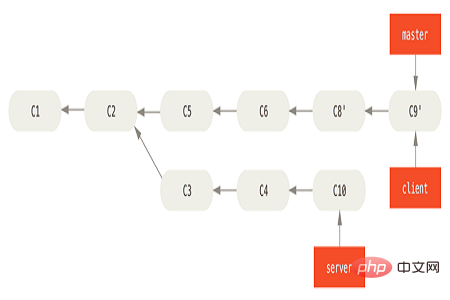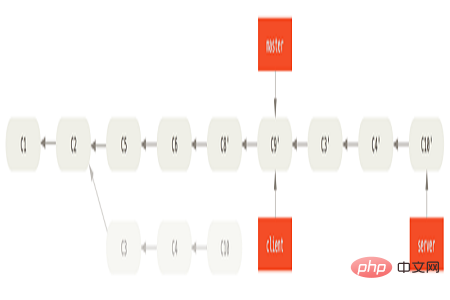What is rebase? How to use the rebase command? Let's study how to use the git rebase command.
We know that there are two main methods to integrate modifications from different branches in Git: merge and rebase. In fact, git rebase and git merge do the same thing. They are both designed to merge changes from one branch into another, but in slightly different ways.
merge command example
git checkout feature git merge master
In this way, the new merge commit in the feature branch connects the history of the two branches together
Merge The good thing is that it is a safe operation. Existing branches will not be changed
The feature branch will introduce an external merge commit every time upstream changes are merged. If the upstream branch is very active, this will more or less pollute your branch history
Rebase command example
git checkout feature git rebase master
It will move the entire feature branch to the master branch Afterwards, all new commits on the master branch are effectively merged.
However, rebase creates a new commit for each commit on the original branch, rewriting the project history and not merging it. submit.
When rebasing two branches, the generated "replay" does not have to be applied on the target branch. You can also specify another branch for application. You created a feature branch server, added some features to the server, and submitted C3 and C4. Then I created the feature branch client from C3, added some features to the client, and submitted C8 and C9. Finally, you go back to the server branch and commit C10 again.

Suppose you want to merge the changes in the client into the main branch and publish them, but you do not want to merge the changes in the server for the time being, because they still need to be tested more comprehensively. At this time, you can use the --onto option of the git rebase command to select the modifications that are in the client branch but not in the server branch (i.e. C8 and C9), and replay them on the master branch:
$ git rebase --onto master server client
The above command means: "Take out the client branch, find the modifications after the common ancestor of the client branch and the server branch, and then replay them on the master branch." This is a little complicated to understand, but the effect is very cool.

Now you can fast forward the merge master branch.
$ git checkout master $ git merge client

Next you decide to integrate the changes in the server branch. Use the git rebase [basebranch] [topicbranch] command to directly rebase the feature branch (ie server in this example) to the target branch (ie master). This saves you the multiple steps of first switching to the server branch and then executing the rebase command on it.

$ git rebase master server
Usage scenarios of rebase in development
rebase can be applied more or less in your team’s Git workflow
Local Cleanup
Perform interactive rebase every once in a while, you can ensure that every commit in your feature branch is focused and meaningful. You don’t have to worry about creating orphaned commits when writing code - because you will definitely be able to fix it later
The following command interactively rebases the latest 3 commits:
git checkout feature git rebase -i HEAD~3
You actually No branch is moved - you just merge the next 3 commits
Interactive rebase is a great way to introduce git rebase into your workflow because it only affects the local branch. Other developers can only see the results of what you've done, which is a very neat, easy-to-track branch history.
But again, this can only be used on private branches. If you work with other developers on the same feature branch, the branch is public and you cannot rewrite the history.
The above is the detailed content of How to use git rebase to merge branches in Git. For more information, please follow other related articles on the PHP Chinese website!

Hot AI Tools

Undress AI Tool
Undress images for free

Undresser.AI Undress
AI-powered app for creating realistic nude photos

AI Clothes Remover
Online AI tool for removing clothes from photos.

Clothoff.io
AI clothes remover

Video Face Swap
Swap faces in any video effortlessly with our completely free AI face swap tool!

Hot Article

Hot Tools

Notepad++7.3.1
Easy-to-use and free code editor

SublimeText3 Chinese version
Chinese version, very easy to use

Zend Studio 13.0.1
Powerful PHP integrated development environment

Dreamweaver CS6
Visual web development tools

SublimeText3 Mac version
God-level code editing software (SublimeText3)

Hot Topics
 The first tutorial to open pycharm is a must-see setup guide for the first time
May 23, 2025 pm 10:48 PM
The first tutorial to open pycharm is a must-see setup guide for the first time
May 23, 2025 pm 10:48 PM
When you open PyCharm for the first time, you should first create a new project and select a virtual environment, and then be familiar with the editor area, toolbar, navigation bar, and status bar. Set up Darcula themes and Consolas fonts, use smart tips and debugging tools to get more efficient, and learn Git integration.
 How to verify social security number string in PHP?
May 23, 2025 pm 08:21 PM
How to verify social security number string in PHP?
May 23, 2025 pm 08:21 PM
Social security number verification is implemented in PHP through regular expressions and simple logic. 1) Use regular expressions to clean the input and remove non-numeric characters. 2) Check whether the string length is 18 bits. 3) Calculate and verify the check bit to ensure that it matches the last bit of the input.
 How to use graphical tools to compare version differences in git
May 22, 2025 pm 10:48 PM
How to use graphical tools to compare version differences in git
May 22, 2025 pm 10:48 PM
The steps to effectively use graphical tools to compare the differences in Git versions include: 1. Open GitKraken and load the repository, 2. Select the version to compare, 3. View the differences, and 4. In-depth analysis. Graphical tools such as GitKraken provide intuitive interfaces and rich features to help developers understand the evolution of code more deeply.
 Gitstatus In-depth analysis of viewing repository status
May 22, 2025 pm 10:54 PM
Gitstatus In-depth analysis of viewing repository status
May 22, 2025 pm 10:54 PM
The gitstatus command is used to display the status of the working directory and temporary storage area. 1. It will check the current branch, 2. Compare the working directory and the temporary storage area, 3. Compare the temporary storage area and the last commit, 4. Check untracked files to help developers understand the state of the warehouse and ensure that there are no omissions before committing.
 Configure VSCode and GitHub for code synchronization
May 20, 2025 pm 06:33 PM
Configure VSCode and GitHub for code synchronization
May 20, 2025 pm 06:33 PM
Configuring VSCode to synchronize code with GitHub can improve development efficiency and team collaboration. First, install the "GitHubPullRequestsandIssues" and "GitLens" plugins; second, configure the GitHub account; then clone or create a repository; finally, submit and push the code to GitHub.
 How to develop a complete Python Web application?
May 23, 2025 pm 10:39 PM
How to develop a complete Python Web application?
May 23, 2025 pm 10:39 PM
To develop a complete Python Web application, follow these steps: 1. Choose the appropriate framework, such as Django or Flask. 2. Integrate databases and use ORMs such as SQLAlchemy. 3. Design the front-end and use Vue or React. 4. Perform the test, use pytest or unittest. 5. Deploy applications, use Docker and platforms such as Heroku or AWS. Through these steps, powerful and efficient web applications can be built.
 How to verify IMEISV strings in PHP?
May 28, 2025 pm 03:39 PM
How to verify IMEISV strings in PHP?
May 28, 2025 pm 03:39 PM
Verifying an IMEISV string in PHP requires the following steps: 1. Verify the 16-bit numeric format using regular expressions. 2. Verify the validity of the IMEI part through the Luhn algorithm. 3. Check the validity of the software version number. The complete verification process includes format verification, Luhn checking and software version number checking to ensure the validity of IMEISV.
 How to create and delete tags on remote repository
May 22, 2025 pm 10:33 PM
How to create and delete tags on remote repository
May 22, 2025 pm 10:33 PM
Create tags on remote repository using gitpushorigin, delete tags using gitpushorigin--delete. The specific steps include: 1. Create a local tag: gittagv1.0. 2. Push to remote: gitpushoriginv1.0. 3. Delete local tag: gittag-dv1.0. 4. Delete remote tag: gitpushorigin--deletev1.0.





